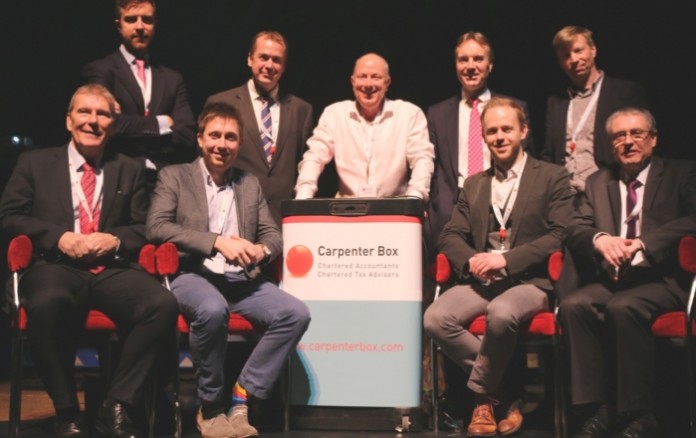Over 130 people gathered recently at the Hawth Theatre in Crawley to discuss the many alternative funding options available to businesses of all shapes and sizes whose funding needs either fell out of the scope of the high street banks or needed a more flexible approach. The high profile panel event, hosted by Sussex-based chartered accountants and business advisers, Carpenter Box, left many attendees amazed at just how many options were available to them.
Tony Summers, Partner at Carpenter Box, came up with the idea for this event and invited eight high calibre panel members who he knew would bring a wealth of knowledge to the discussions given their various areas of alternative funding expertise.
The panel included Marcus Stuttard, Head of AIM at the London Stock Exchange, Andy Davis, ex FT journalist and author of ‘Beyond the Banks’, Steven Renwick, founder and CEO of Satago, Stuart Noakes, Head of Tax at Carpenter Box, Martin Coomber, Senior Fund Manager at The FSE Group, James Bryant of MarketInvoice, James Livingston, Director at the Foresight Group and Andrew Rutherford, Commercial Director for the Southern Region of Shawbrook Business Credit.
Audience members included those from local start-ups right through to large international corporations. With such a wide spectrum of topics to cover, Carpenter Box Partner Chris Coopey chaired the event directing pre-notified questions from the audience to the panel looking to the most appropriate expert to comment before opening the subject to all of the panel. Questions ranged from what are the costs, the timescales involved and the security needed for a business to raise £1m, to when should a business consider crowdfunding a suitable choice to finance business growth.
Chris then opened the floor up to questions from the audience, which included what the panel thought of the European Horizon 2020 scheme – the biggest EU Research and Innovation programme ever with 80 billion euros of funding available over seven years (2014 – 2020) – as well as specific questions about crowdfunding and possible regulation.
Tony was thrilled with the success of the event and commented: “Overall, the panel provided a fascinating insight to the audience as to what funding streams were suitable for which purpose. The panel’s knowledge of what was available was pretty comprehensive. Whether it was an occasional shot in the cash flow arm from invoice financing to private equity, or venture capital investment to larger asset based lending, or the possibility of raising funding by floating on the AIM – the Alternative Investment Market”.
After the main event, guests had the opportunity to chat with the panel members about their individual funding requirements, as well as network with other businesses.
Tony added: “Many of those who I and my colleagues spoke to were unaware and astonished by the range of alternative funding opportunities available, echoing the panellists’ view that it was well worthwhile getting guidance from a specialist to understand the pros and cons of each before committing to one route”.
From the discussions it was very clear that there was much to consider, such as the level of funding required, what was it required for and whether the need was for long or short term funding or investment. Having advisors who understand the many options is key in both signposting the available funding and making the case to access it.






















